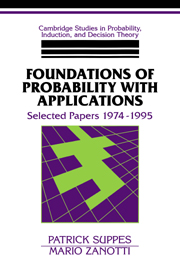Book contents
- Frontmatter
- Contents
- Preface
- Part I Foundations of probability
- 1 Necessary and sufficient conditions for existence of a unique measure strictly agreeing with a qualitative probability ordering
- 2 Necessary and sufficient qualitative axioms for conditional probability
- 3 On using random relations to generate upper and lower probabilities
- 4 Conditions on upper and lower probabilities to imply probabilities
- 5 Qualitative axioms for random-variable representation of extensive quantities
- Part II Causality and quantum mechanics
- Part III Applications in education
- Author Index
- Subject Index
2 - Necessary and sufficient qualitative axioms for conditional probability
Published online by Cambridge University Press: 05 June 2012
- Frontmatter
- Contents
- Preface
- Part I Foundations of probability
- 1 Necessary and sufficient conditions for existence of a unique measure strictly agreeing with a qualitative probability ordering
- 2 Necessary and sufficient qualitative axioms for conditional probability
- 3 On using random relations to generate upper and lower probabilities
- 4 Conditions on upper and lower probabilities to imply probabilities
- 5 Qualitative axioms for random-variable representation of extensive quantities
- Part II Causality and quantum mechanics
- Part III Applications in education
- Author Index
- Subject Index
Summary
INTRODUCTION
In a previous paper (Suppes and Zanotti, 1976) we gave simple necessary and sufficient qualitative axioms for the existence of a unique expectation function for the set of extended indicator functions. As we defined this set of functions earlier, it is the closure of the set of indicator functions of events under function addition. In the present paper we extend the same approach to conditional probability. One of the more troublesome aspects of the qualitative theory of conditional probability is that A | B is not an object – in particular it is not a new event composed somehow from events A and B. Thus the qualitative theory rests on a quaternary relation A | B ≽ C | D, which is read: event A given event B is at least as probable as event C given event D. There have been a number of attempts to axiomatize this quaternary relation (Koopman, 1940a, 1940b; Aczél, 1961, 1966, p. 319; Luce, 1968; Domotor, 1969; Krantz et al., 1971; and Suppes, 1973). The only one of these axiomatizations to address the problem of giving necessary and sufficient conditions is the work of Domotor, which approaches the subject in the finite case in a style similar to that of Scott (1964).
By using indicator functions or, more generally, extended indicator functions, the difficulty of A | B not being an object is eliminated, for Ac | B is just the indicator function of the set A restricted to the set B, that is, Ac | B is a partial function whose domain is B.
- Type
- Chapter
- Information
- Foundations of Probability with ApplicationsSelected Papers 1974–1995, pp. 10 - 16Publisher: Cambridge University PressPrint publication year: 1996

